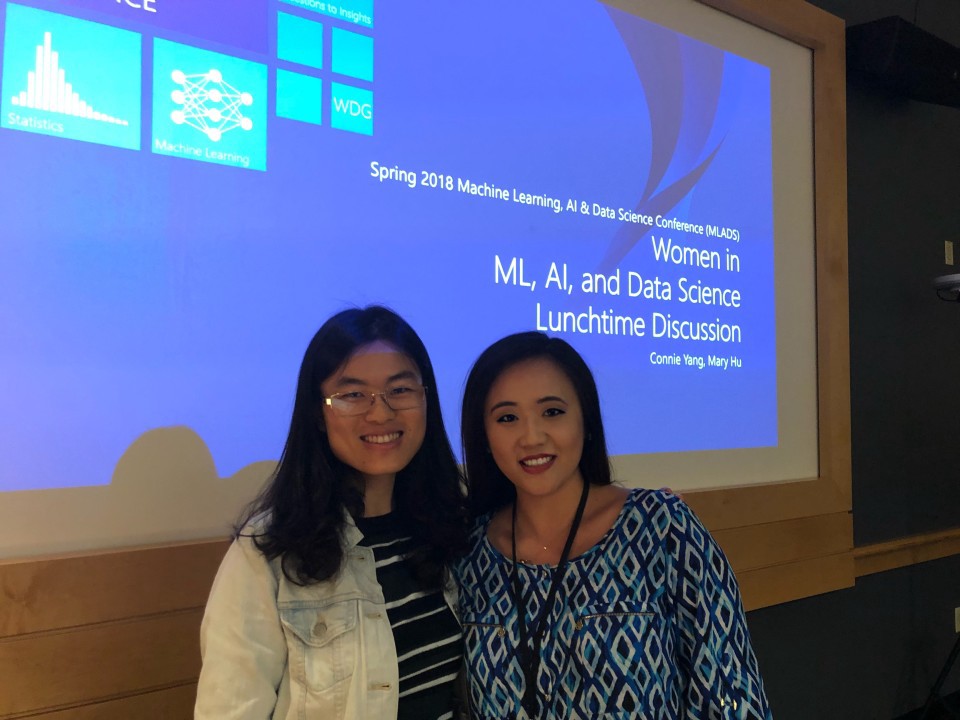Connie Yang’s Math of Change
By Hilary Daninhirsch
Media Inquiries- Associate Dean for Communications, MCS
- 4122689982
Alumna Connie Yang’s passion for math was evident at an early age. With math backgrounds of their own, her parents nurtured Connie’s love for the subject and inspired her to pursue it, too.
So it adds up that she was drawn to Carnegie Mellon University’s new honors math program in the Mellon College of Science during her first year on campus in 2013.
“As I actively sought out what my career aspirations could be, I came across the burgeoning field of data science,” says Connie, who graduated in 2017 with a bachelor’s degree in mathematical sciences with a focus on computational and applied mathematics.
“Math and computer science are tools to solve problems, and it was exciting to think about the prospective applications of those tools to solve real-world problems.”
With an approved patent and a pending patent in the applied machine learning space, a seat as an advisory board member for the University of Washington’s graduate degree data science program and a selection to On Deck Data Science’s first fellowship cohort — she is well on her way to making a difference.
From the Ground Up
Connie started out at Microsoft after graduation and worked on the company’s core data science team on projects for products like Azure, HoloLens, Xbox, LinkedIn and more. While there, she developed clarity about the data science path she wanted to take, knowing she’d eventually want to be a technical leader.
Last year, she joined Pallet as the New York City tech startup’s lead data scientist.
“I wanted to apply my machine learning knowledge in engineering and try a drastically different environment than well-established tech companies,” Connie says. “I wanted to integrate and pioneer the data science work from the ground up as we’re simultaneously building a product.”
Pallet is an infrastructure product that enables users and companies to build their own native recruiting tools. With those tools, companies then can hire talent that hangs out natively in internet communities like Discord, Substack, Twitter, YouTube, Slack and various online newsletters.
At Pallet, Connie is engaging in a broad range of projects from data engineering to data science and machine learning engineering to data analytics.
“I work with everyone across the company from engineering to marketing to operations, so I’m also establishing a culture of when and where we should leverage data science to drive the most impact in the short and long term,” she says.
Supporting Women in STEM
Connie is as committed to helping other women in STEM fields as she is about data science and math, particularly as she’s seen firsthand the career challenges her mother faced as one of the few pioneering women in computer science.
“She has been a software engineer in tech for more than 20 years, often being the only woman and person of color engineer,” Connie says. “Even with a new generation, I’ve always been surrounded by more male counterparts than female from high school to CMU to Microsoft to generally working in the technical space.”
“Although momentous strides have been made since my parents' generation, there are still specific challenges and stigmas women face in the technical space, especially for women in leadership positions.”
Pulling from that experience, Connie co-founded the first Women in Data Science Community when she was at Microsoft to nurture other women along this career path. The community was inspired by a CMU StuCo class she taught with a friend their senior year.
“We were both passionate about empowering young women, so we worked with (Dietrich College of Humanities and Social Sciences Associate Professor) Lisa Tetrault to put together a semester-long StuCo on female empowerment,” Connie says.
She casually mentioned to a Microsoft colleague about her interest in empowering women in tech, and he asked if she’d lead a Women in Data Science workshop.
“After doing that workshop, feedback from attendees surfaced multiple needs with emergent themes around the desire for a unified community of support and a platform to share knowledge,” Connie says.
Her colleagues wanted support in understanding available career paths, advancing technical applied research in the field, applying data science to their work, growing and leading a data team, and starting a career in data science.
With her co-founder, she decided to start an ongoing Women in Data Science community — growing the group to more than 800 members globally. They organized community events attended by executives and researchers, coordinated career and technical workshops and spearheaded a mentorship program.
Connie hopes to start a Women in Data Science community at Pallet as the company grows.
“There are definitely still gaps in representation, income, career trajectory and growth,” Connie says. “I definitely want to lead by example and help with bridging those gaps.”
